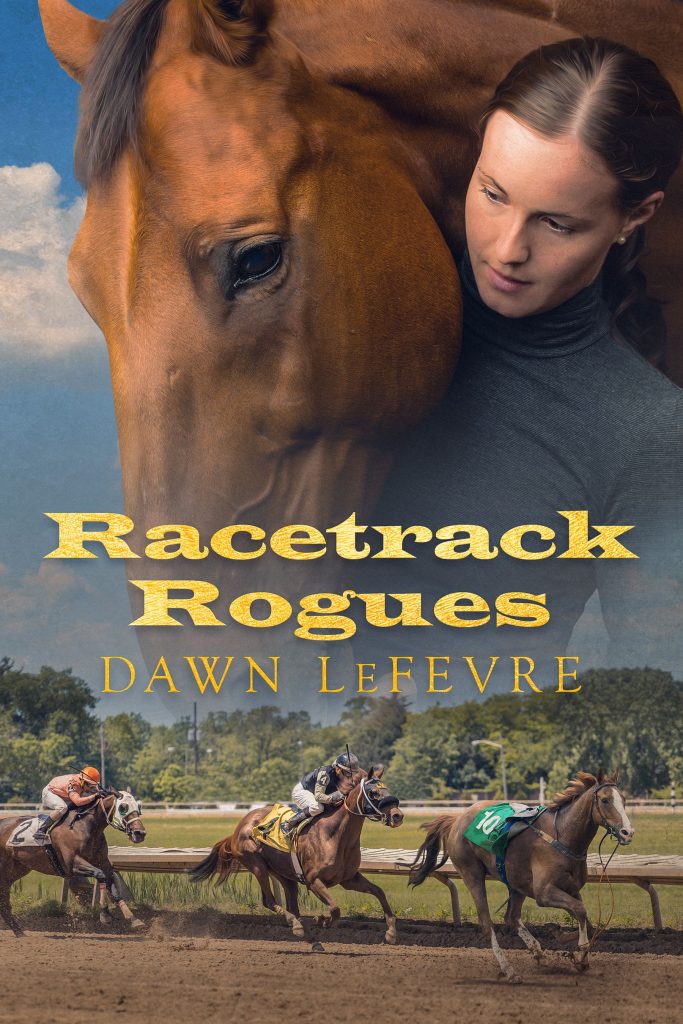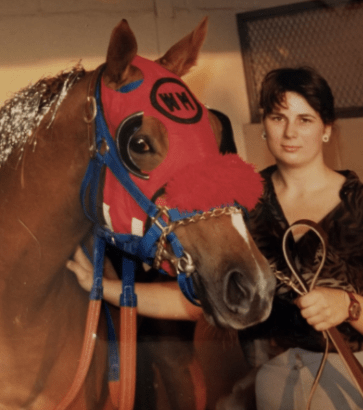
Our next offering from Past The Wire’s “Author’s Corner” is Dawn Leferve’s exciting new novel Racetrack Rogues. Drawing on her own experiences as a horsewoman Dawn crafts an exciting adventure. The protagonist of Racetrack Rogues is a huge, mean Thoroughbred named Jersey Judge.
Editor: First of all, congratulations on your book Backstretch Girls winning Best Horse Racing Fiction at the Equus Film and Arts Festival last month.
Dawn: Thank you! It was mind-blowing to say the least. I feel so honored and thrilled.
E: You have a new horse racing fiction book out now called Racetrack Rogues. What is it about?
D: It’s set in the 1990s and tells the story of a college student named Dahlia and her rocky relationship with her mother Marilyn, who’s a jockey at Garden State Park. Dahlia dreams of becoming an equine orthopedic surgeon but after Marilyn’s sudden death she returns home to her grandparent’s horse farm. There she gets caught up with helping rogue racehorses and by healing them, she in turn heals herself.
E: Racetrack Rogues features several misfit racehorses; can you tell us more about them?
D: The star of the book is a huge, mean Thoroughbred named Jersey Judge. He’s put grooms in the hospital and even attacked Dahlia’s grandfather. Dahlia jokingly nicknames the horse Carnivore and in one explosive scene, the two of them bond through their mutual pain. Carnivore is based on a real racehorse that I’d groomed named Judge’s Air who shares the same nickname and affinity for marathon starter handicaps. Dahlia eventually takes on a nervous filly named Moonlight Maiden that refuses to eat, a gate-flipper named Super Monarch, and Sugar Muffin, a pony-sized victim of neglect. All were inspired by horses that I’d worked with during my days on the racetrack.

Dawn Lefevre with Katy C. (Photo courtesy of Dawn Lefevre)
E: What was your biggest challenge as a trainer?
D: Figuring out what makes a particular horse tick. Right from the get-go, I didn’t get many “normal” horses. The first horse I ever trained was a little nickel claimer named Katie C. who had her fair share of problems. She was a bleeder, she had back issues and was anti-social. Two of the three I was able to manage but I never could find a way to make her “social”. You look down any shedrow and every horse has its head stuck out over the webbings, checking out what’s going on. Until you got to Katie’s stall, then all you saw was her red butt. She’d stand there facing the back wall of her stall 24/7 and couldn’t care less about the outside world. I tried giving her toys and extra attention but in the end, she just wanted to be left alone. I had more success with stopping her from bleeding by limiting her exposure to dust, wetting down her hay, daily nebulization treatments and pre-race Lasix injections. I discovered that Katie had a sore back the first time I tried to gallop her – I put the exercise rider up and she sank to her knees. So I put her on a regimen of daily massages and acupuncture treatments. To keep the weight off her sore back I ponied her instead of galloping her. She responded by winning the first time I ran her, breaking my maiden as a trainer. She never won another race but she was consistent – I nicknamed her “Katie Three” because she had a ton of thirds.
E: Have you trained any rogues?
D: I prefer to think of them as “problem children”. The key to helping a difficult horse is to figure out the cause of its undesirable behavior. Sometimes it can be a physical problem that’s causing them to act up – for example, a bad tooth can make a horse lug in or duck to the outside. I had one filly who worked bullets in the morning but during races she’d suck back from the other horses. Turned out that she was half-blind in her right eye so we had a special pair of blinkers made to cover her bad eye and she went on to win several races. Mental problems are more difficult to manage and require more time and patience to help the horse work through its fear. We had one horse who was claustrophobic to the point of flipping over in the starting gate. So we started taking him on rides in a small two-horse trailer to help him overcome his claustrophobia. Between that and many gate schooling sessions, he not only overcame his fear, he went on to become an honest runner. It’s always gratifying whenever you win a race but it is especially rewarding when you win with one of your “problem children.”
E: Was there any horse in particular that caused you to lose sleep?
D: I had one horse that kept breaking free from his lead pony in the post parade and would run off and get scratched by the stewards. He was on the verge of being ruled off for life so I said, “Fine, I’ll just take him to the gate myself.” And I did. The stewards gave us permission to leave the paddock early and I had to lead my horse and jockey all the way up to the six furlong chute. The first time I did this, the assistant starters actually bet on whether or not I’d make it there with my horse! When I got to the gate and handed my horse over to the assistant starter, he actually congratulated me! It’s quite a long walk to the chute and the ambulance attendants felt sorry for me so they gave me a ride back. I will never forget that unique perspective of watching my horse win while riding in the ambulance that follows the field around the track. For the rest of that horse’s time with me, I always walked him to the starting gate. It was a great weight loss program. (laughs)
E: What inspired you to write this book?
D: The unexpected death of my mother, Anne Bradshaw, who was a horse racing super fan and a two dollar show bettor. She went to Saratoga every year, kept scrapbooks of her favorite horses and recorded every major horse race. I was overwhelmed by just how much memorabilia she had collected – everything from racing programs to books and magazines to Secretariat’s tail hair. Like my main character Dahlia, I had a hard time coping after my mother’s passing. It was my mother’s passion for horse racing that incited me to become a trainer. She passed away in March of 2018 and to this day I can’t watch a horse race on TV without expecting the phone to ring the second the horses cross the wire and hearing my mother’s commentary on the results. Only by writing this book was I finally able to work through my pain.
E: What part of the book was the most fun to write?
D: I love the scene when Serena takes Dahlia out to celebrate her twenty-first birthday and forces her to ride the mechanical bull at a casino. Dahlia squaring off with Bill Bassett is my favorite scene overall and there are some parts with Crazy Cory where I laughed as I wrote them.
E: What’s next on your agenda?
D: I’m currently working on another novel that features Crazy Cory, the break-out character from Racetrack Rogues. He was the comic relief of that book and garnered such a positive reaction from my readers that I just have to run with it. It’s such fun writing a character like Cory and right now I think we all could use a little more fun.
E: Thank you, Dawn. We all look forward to reading your book!
_________________________
Racetrack Rogues and Backstretch Girls can be purchased at Amazon and other online and brick-and-mortar booksellers.
Dawn is also a contributing writer for Past The Wire. Click here to read Dawn’s articles.


